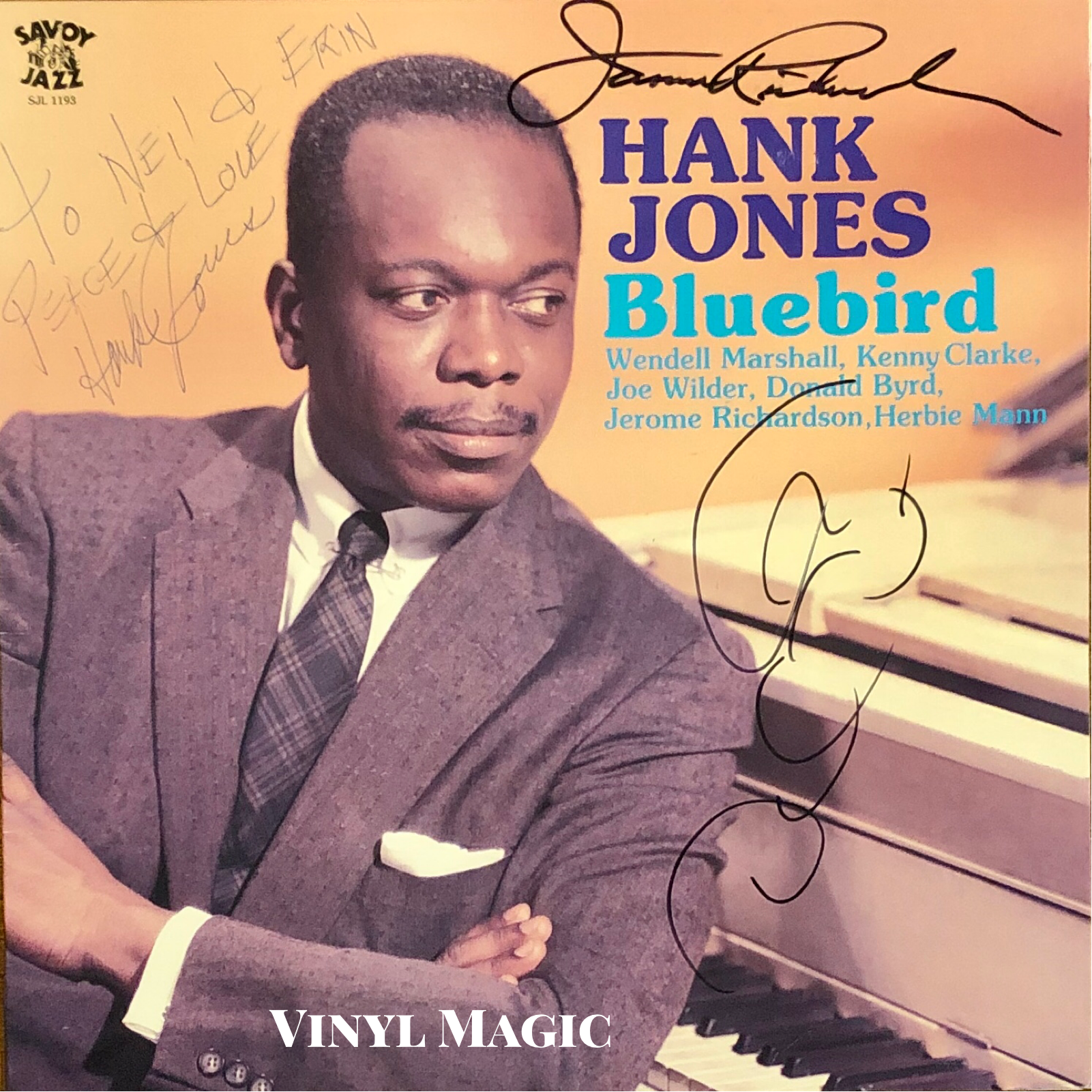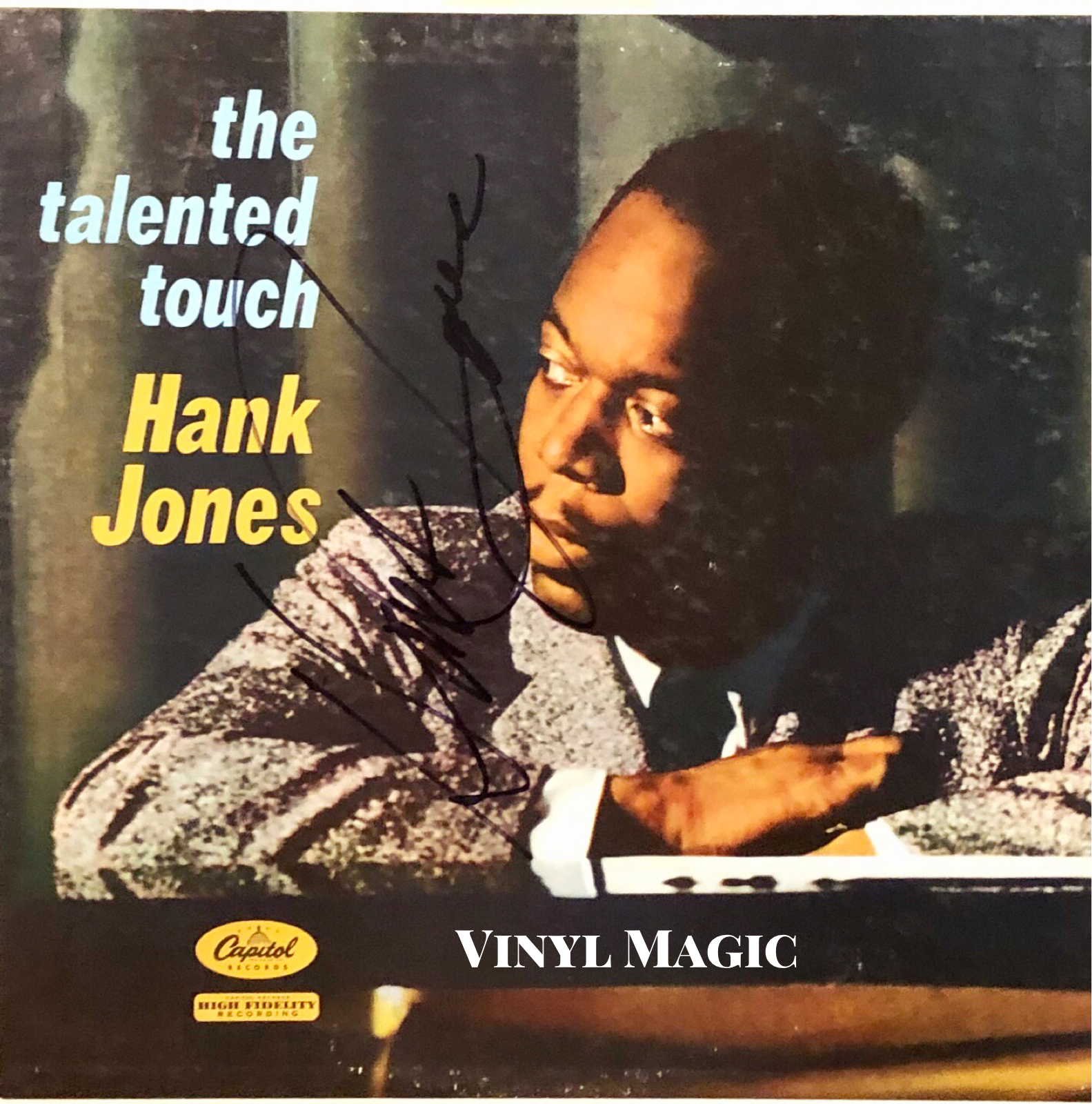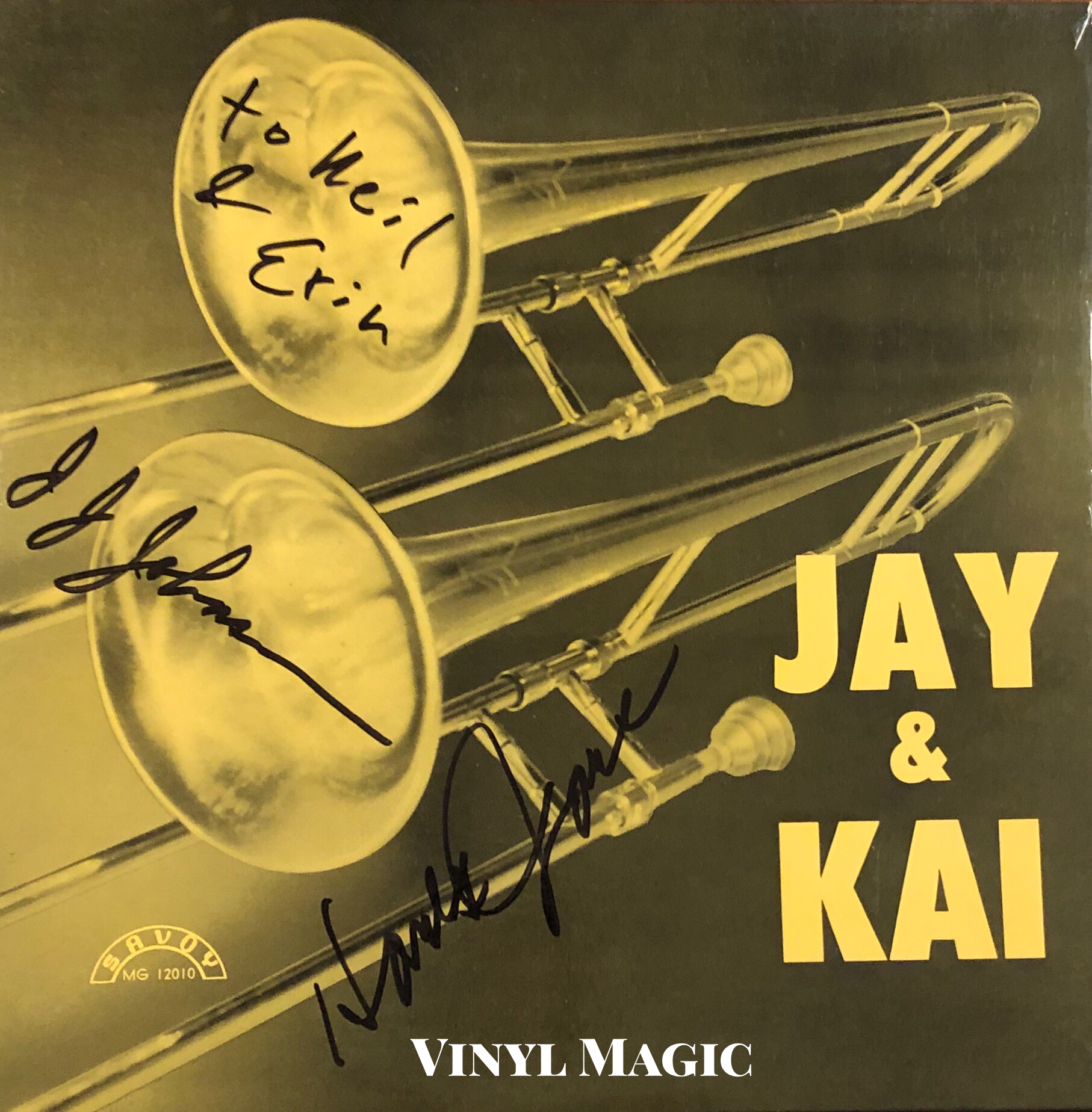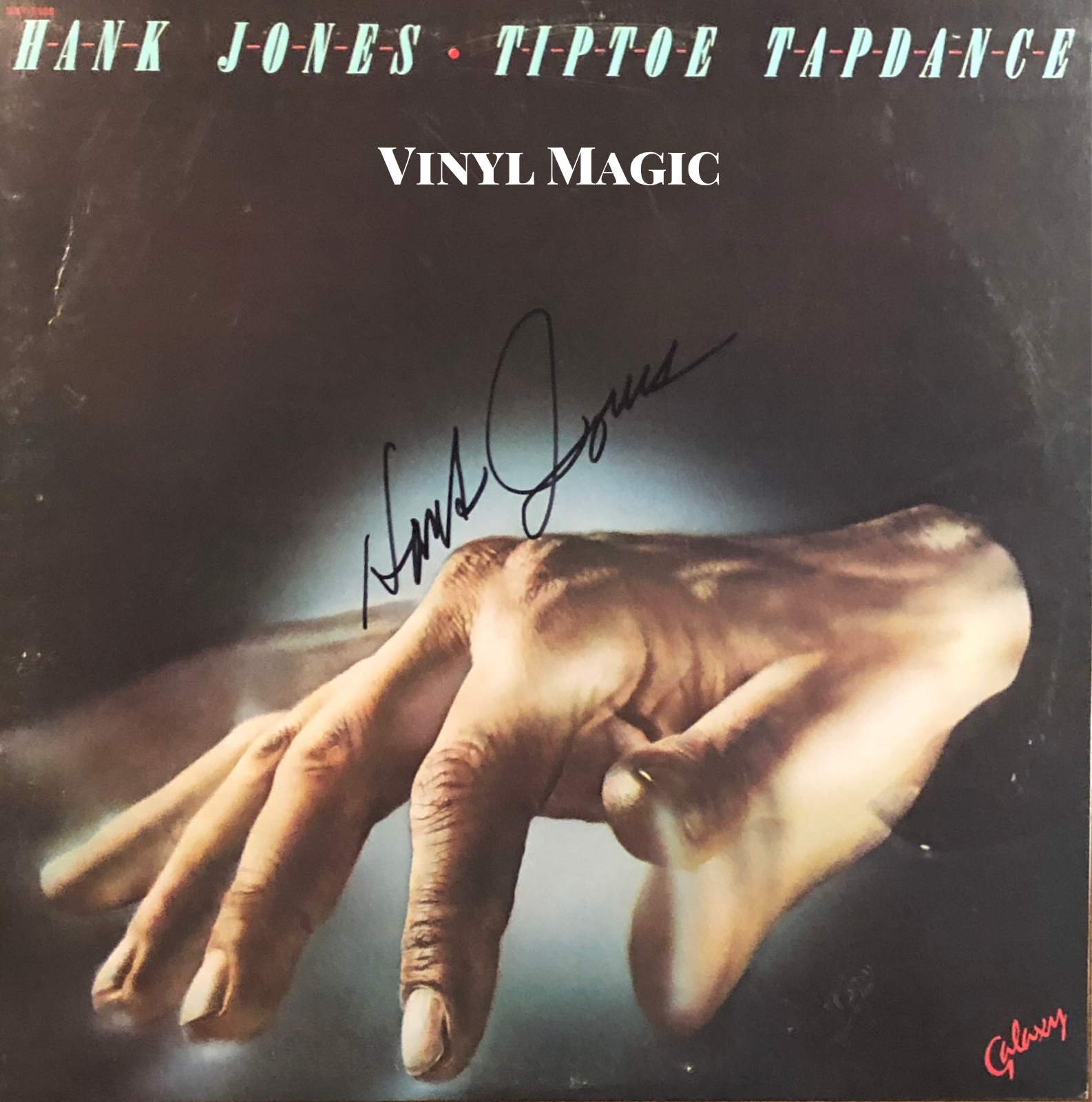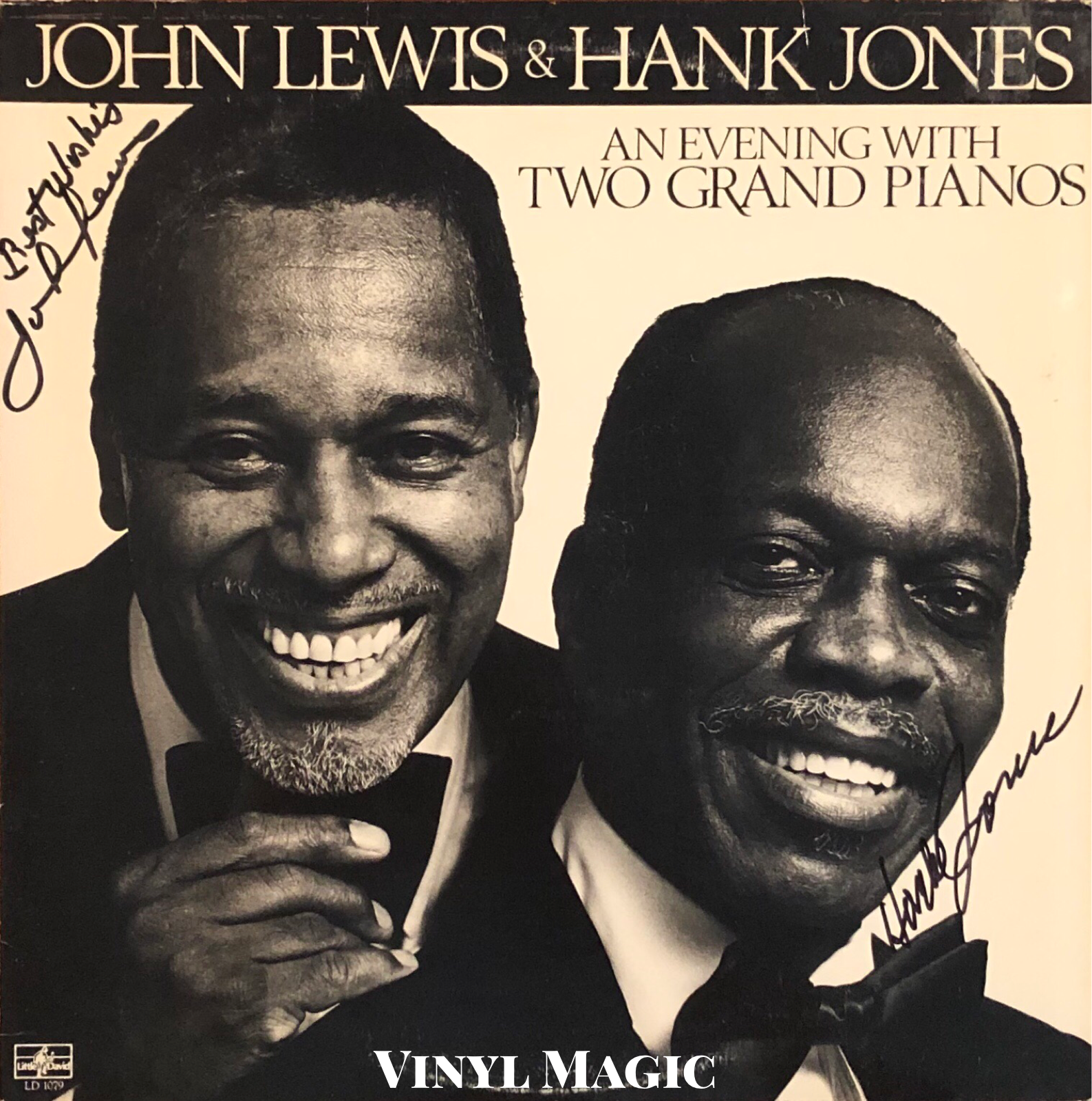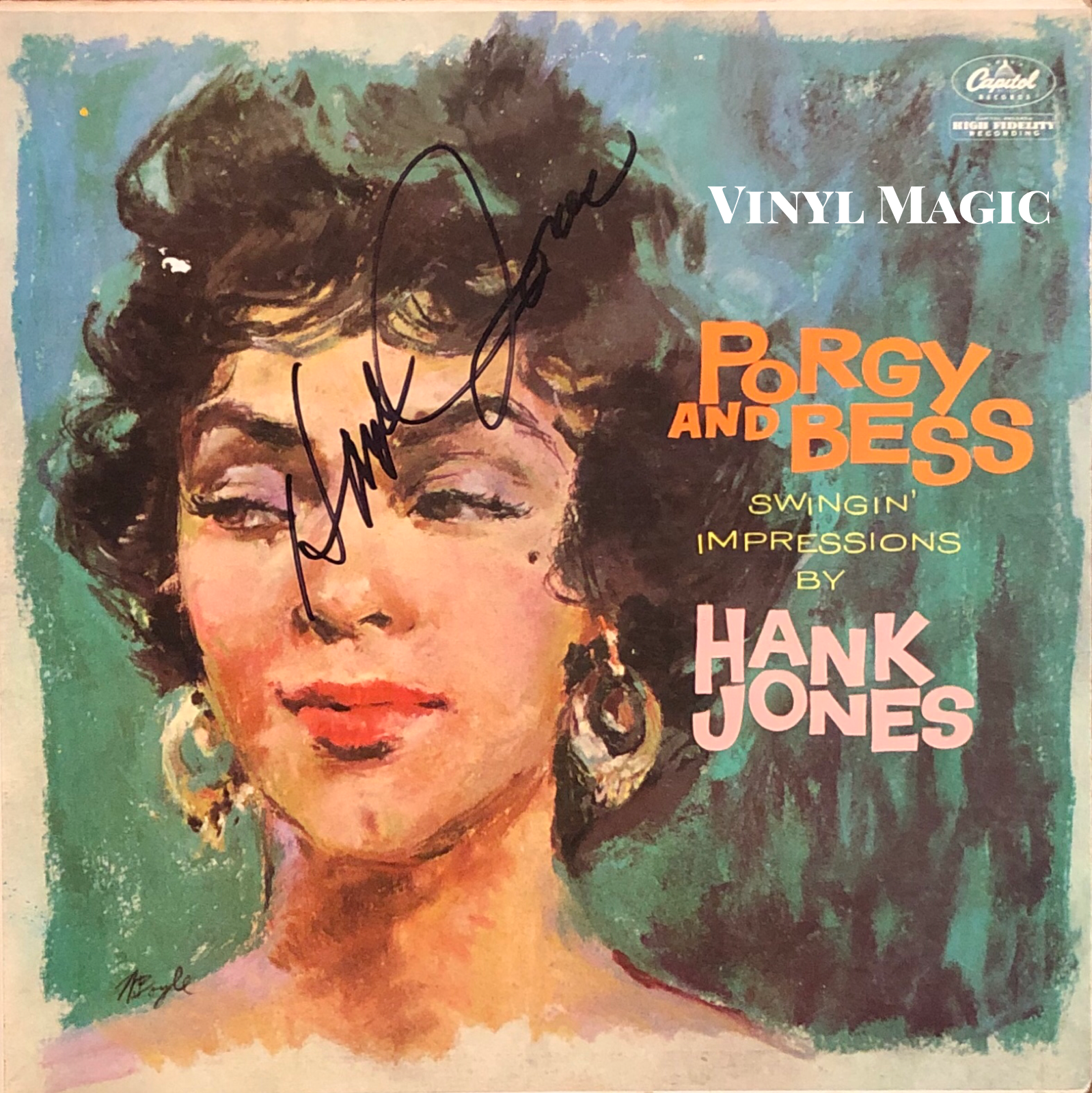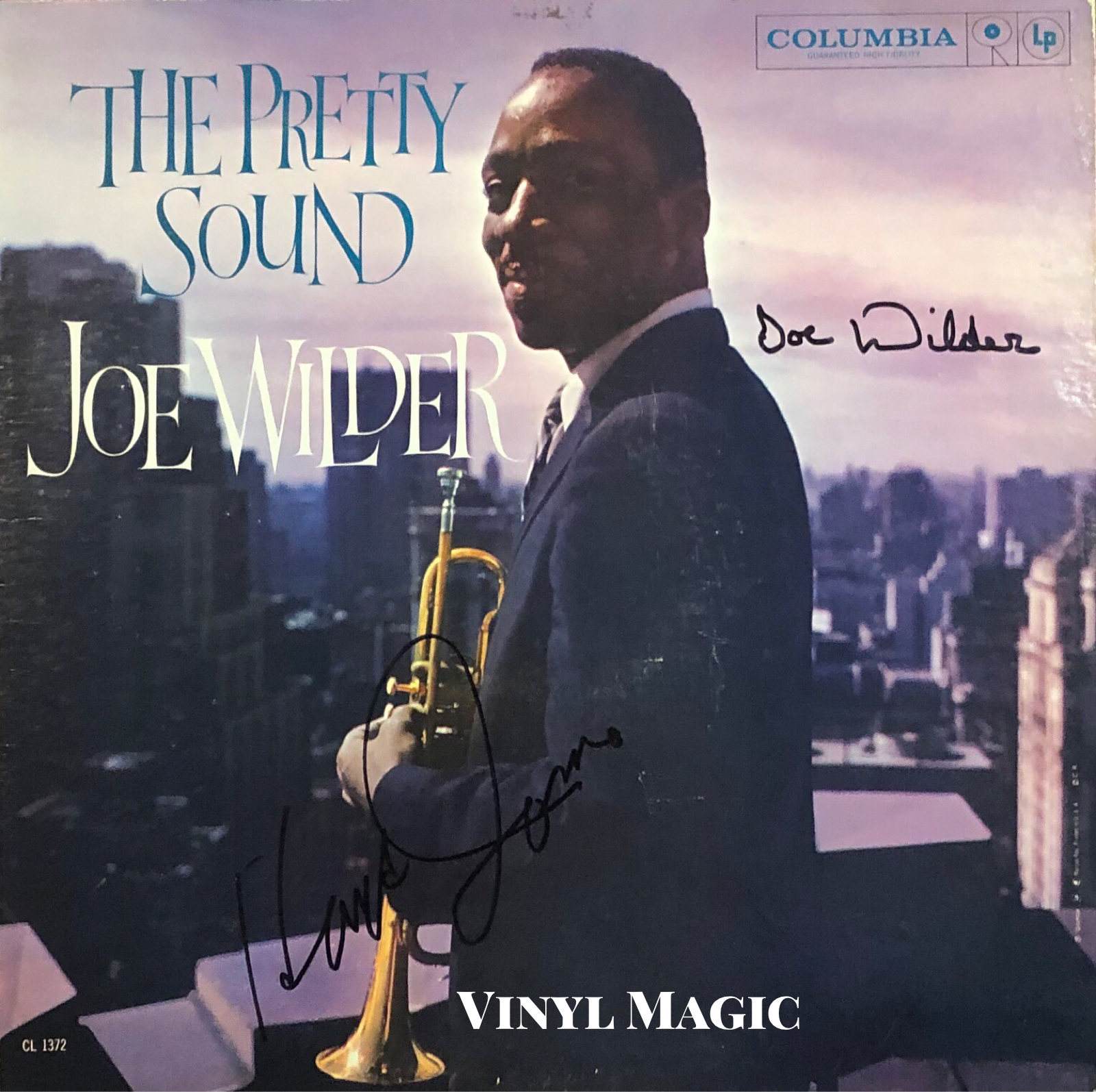Hank Jones and Me…
Bluebird (1955) signed by Hank, Donald Byrd., Jerome Richardson
My idol is the great Art Tatum, there’s nobody like him. Maybe somebody will come along years from now or who knows, maybe they’re already here and I haven’t heard them. But he is absolutely the greatest pianist I’ve ever heard for ideas, technique, stamina, everything. He has a wonderful sense of humor, it’s there in his interpolations, and he plays in such a way that anybody who never heard him before can understand what he does. He’s always listening carefully, and he has a great ear. He has that blinding technique, can do anything he thinks of, and with either hand. His technique, I think, is a gift from God. Put all that together, you’ve got an Art Tatum. That’s how he was.
Hank Jones
West Side Story (1957) signed by Hank
The Talented Touch (1958) signed by Hank
You know, what I enjoy the most is when I don’t make too many mistakes. Because every time you sit down at the piano you’re challenging yourself. But it’s not a competition. What you’re doing is you’re trying to make each performance better than the last one. That’s what you work for. That’s what you hope for...not perfection, because I don’t believe there is such a thing as perfect. Perfection is something you strive for that you never actually reach. It’s a place where you and the instrument become one—your mind, your fingers, your body. I’m still trying to reach that level.
Hank Jones
Jay & Kai (1955) signed by Hank, J.J. Johnson
Portrait Of Art Farmer (1958) signed by Hank, Art Farmer, Roy Haynes
I don’t think I’ve done my best yet. That’s a goal that I’m working toward, and I haven’t gotten there yet. It’s like the story, and it’s true, about the guy who was interviewing George Shearing, and asked George if he’d been blind all his life. And George answered, ‘Not yet.’ So, no, I haven’t done my best yet.
Hank Jones
Bags & Trane (1961) signed by Hank, Milt Jackson
Happenings (1966) signed by Hank, Clark Terry
He was the first one to use all those harmonic devices that later guys like Dizzy and Charlie used, It sounded new to people who heard it for the first time. But it wasn’t new to someone who’d listened to Art Tatum. Mozart, Chopin, Liszt, Rachmaninoff-that’s what he was, all rolled into one. He had a great impact on me, especially harmonically. I couldn’t play lyrically the way he did-few people could-so I just worked to adopt his harmonic ideas.
Hank Jones on Art Tatum
Jazz At The Lymans (1967-1971, private press) signed by Hank, Elvin Jones, Milt Hinton, Coleman Hawkins, Clark Terry
Jazz At The Lymans private press back cover
In some respects, Oscar was very close to Tatum. He had the required technique to do it. And he admired Tatum, as we all did. But nobody played exactly like Tatum. We have to establish that he was in a class by himself. Players like Oscar, who play a fine piano, actually play a style that’s reminiscent sometimes of Tatum, but not completely. And Oscar would be the first one to acknowledge that.
Hank Jones
Elvin! (1962) signed by Hank, Elvin Jones, Frank Foster, Frank Wess
Strike Up The Band (1976) signed by Hank, Bobby Hackett, Richard Davis, Bucky Pizarelli, Zoot Sims
Hank Jones is my favorite Jazz pianist. Well, maybe top 3, certainly top 5. Born in Vicksburg, Mississippi, Hank was raised in Pontiac, Michigan, the eldest brother to composer and trumpeter Thad and drummer extraordinaire Elvin. Most people think that the Marsalis clan from New Orleans is the First Family in Jazz. They would be wrong. Flatly, grossly, indisputably wrong. While brothers Wynton, Branford, Delfaeyo, Jason, and papa bear Ellis are very accomplished, their efforts pale in comparison to the prodigious talents of the Jones freres. Thad Jones was a brilliant arranger and trumpeter who made his bones playing with the Count Basie Orchestra before starting The Mel Lewis-Thad Jones Big Band. Elvin Jones was the drummer of choice for Miles Davis, Charles Mingus and Bud Powell, before settling in for a six year gig with John Coltrane. And Hank Jones is Hank Jones. Game. Set. Match.
Jones Brown Smith (1976) signed by Hank, Ray Brown
Our Delights (1978) signed by Hank, Tommy Flanagan
Hank studied classical music at first, and his mother was a difficult task master. She threatened him with his very sustenance if he didn't practice enough, "Either you practice or you don't have dinner," came her steely direction. She helped instill a work ethic and dedication which would last Hank's entire recording and performing career, some seventy-five years and hundreds and hundreds of recordings. As he once said, "You see, there is no magic involved in playing the piano. It takes hard work, continuous hard work. Whatever skills are involved, it’s a matter of practice. You can never reach a point where you don’t think it’s necessary to practice anymore. It’s always necessary to practice everyday. If you can do that, then you can maintain whatever skills you have, and perhaps even increase your skills. To me, that’s the only way to do it." Clearly, Hank Jones was not Allen Iverson!
The Trio (1977) signed by Hank
Groovin’ High (1978) signed by Hank, Mickey Roker
In 1944, Hank relocated to New York City and as his career evolved, he played with many great artists on some of their seminal recordings, everyone from Billie Holiday to Billy Eckstine, Ella Fitzgerald to Coleman Hawkins, John Coltrane to Miles Davis, Louis Armstrong to Jackie Gleason. Hank is one of the rare jazz artists to play a sold-out Madison Square Garden. On May 19, 1962, he accompanied a shimmering Marilyn Monroe as she sang a sensuous "Happy Birthday Mr. President!" to President Kennedy. As Marilyn slinks and simmers on stage to greet a well lubricated Peter Lawford at the podium, a furtive image in the background darts to the piano. That would be Hank, barely twenty feet from stardom and infamy.
Ain’t Misbehavin’ (1978) signed by Hank, Kenny Burrell, Richard Davis, Teddy Edwards, Roy Haynes
Tiptoe Tapdance (1978) signed by Hank
Hank was also the staff pianist for CBS from 1959 - 1976 and he played on The Ed Sullivan Show and The Jackie Gleason Show. Experiences ranged from the sublime, accompanying Frank Sinatra, to the ridiculous, accompanying assorted jugglers, elephants and circus acts. When pianists talk about having range, I don't think this is what they have in mind, but Hank delivered the goods with his usual aplomb and good taste.
The Big Challenge (1957) signed by Hank
I saw Hank perform many times through the years, and I was always struck by his deft touch, his exquisite lyricism and his impeccable rhythm and swing. Always dressed in a beautiful suit and tie, he was urbane and elegant. In fact, one of his first albums was simply titled Urbanity,which featured a provocative cover drawn by illustrator David Stone Martin, whose work has been displayed in The Metropolitan Museum Of Art and The Smithsonian. Belying Hank's stately, dignified playing, the bawdy drawing seems more likely from the pen of Toulouse-Lautrec, who famously depicted Parisian prostitutes, than from Stone Martin who went on to illustrate more than 400 (mostly jazz) album covers.
Steal Away (1994) signed by Hank
In 1994, Hank recorded Steal Away, a collection of folk songs, hymns and spirituals with bassist Charlie Haden. It is a gorgeous offering performed with warmth and reverence by two jazz masters. It is one of my favorite albums in any genre. They capture the blues, folk, and gospel inherent in these (mostly) spiritual "Sorrow Songs", songs that have been sung through the ages like "Amazing Grace", "Go Down Moses", "Swing Low, Sweet Chariot", and "Wade In The Water." Author and civil rights activist W.E.B. Du Bois presciently described these songs in The Souls of Black Folk: "Through all the sorrow of the Sorrow Songs, there breathes a hope - a faith in the ultimate justice of things. The minor cadences of despair change often to triumph and calm confidence. Sometimes, it is faith in life, sometimes, a faith in death, sometimes, assurance of boundless justice in some fair world beyond." Though Du Bois' words were written in 1903, they reflect Jones' and Haden's timeless work nearly a century later.
Steal Away Program, April 14, 1996, signed by Hank
Steal Away ticket - Gaston Hall, Georgetown University
I saw Charlie Haden and Hank perform these songs on April 14, 1996 In Washington, DC at Gaston Hall, Georgetown University. Gaston Hall, named for Georgetown's first student, William Gaston, was completed in 1901 and it is a beautiful auditorium, replete with an intricately carved wood ceiling, ornate murals and great acoustics. It seats 740 patrons and many prominent folks have speechified there through the years including Presidents Barack Obama and Bill Clinton, would-be Presidents Hillary Clinton and John Kerry, and, even fake Presidents Kevin Spacey and Bono. As uplifting and edifying as I'm sure those speeches were, they were not Hank and Charlie! They performed Steal Away in its entirety, a program of enduring beauty, unyielding faith and unending hope. It was a glorious event in a glorious venue.
An Evening With Two Grand Pianos (1979) signed by Hank, John Lewis
A couple of years later, I saw Hank perform solo piano at the old Iridium in New York City, near Lincoln Center. As always, Hank was wonderfully expressive, his delicate touch informing the jazz standards "My Funny Valentine", Duke Ellington's "It Don't Mean A Thing" and his younger brother Thad's "A Child Is Born." I spent some time with Hank in his dressing room and he was warm and cordial, as he was each time I met him. He seemed born of infinite good cheer. I mentioned how important Steal Away was to me. In times of sorrow or gladness, it was a source of strength or celebration. He smiled, "That's very kind of you to say. Charlie and I had a lot of fun recording and performing those songs." I told him that I bought many copies over the years and gave them as presents for anniversaries, birthdays, weddings, etc. "Thank you" came his modest reply. I mentioned how much I enjoyed their version of "Spiritual", a song written by Charlie's son Josh and covered recently by Johnny Cash on his brilliant American Recordings II. "I'm sorry I didn't play that tonight. You should have asked me before the show and I would have been happy to play it," Hank added thoughtfully. I asked about his (then) recent release, Sarala, recorded with Malian band leader Cheick-Tidiane Seck, an Afro-Pop soul groover, it seemed an unusual diversion in the Hank Jones' oeuvre. "Yes, it is very different. I had an opportunity to record with some very interesting musicians. I like it, and I think you will too," Hank confided. Before leaving, I begged him to record a follow up to Steal Away. "Yes, that sounds like a good idea." he admitted.
In 2012, Come Sunday was released posthumously, another beautiful collection of sacred song duets by Hank and Charlie Haden recorded three months before Hank's untimely passing in 2010. I'd love to take credit for its release, but I had nothing to do with it. Sometimes, great art is its own benefactor.
Porgy & Bess (1959) signed by Hank
In the liner notes to Hank's 1959 Porgy & Bess:
Nat King Cole wrote:
"I've been digging Hank Jones for many years. His ideas and style make him one of the most exciting pianists around anywhere. Anybody who hasn't heard him has been cheated."
George Shearing added:
"He's equally at home swinging or playing a ballad. His taste is impeccable at all times. Hank Jones is undoubtedly one of the finest pianists it has ever been my pleasure to hear, and certainly one of the most under-rated."
High praise indeed from two fellow jazz piano masters.
It is hard to believe that Hank Jones was just getting started in 1959. There were fifty more years to enjoy his elegance, erudition and unparalleled musicianship. In his early nineties near the end of his life, he was still performing. In one of his last interviews in 2009, he said, "I'm just going to keep going until I get it right.... If you stop playing, you stop learning. And then your fingers fall off." Thankfully, his fingers never fell off and he left a wonderful legacy. Thanks again Hank for all the tunes and the treasure.
I guess, Hank Jones is my favorite jazz pianist.
The Pretty Sound (1959) signed by Hank, Joe Wilder
Choice Hank Jones' Cuts (per BK's request!)
https://www.youtube.com/watch?v=VfUW7t8Hc6c
"Spiritual" - Hank Jones and Charlie Haden
https://www.youtube.com/watch?v=ziWaNUwrV7w
"Nobody Knows The Trouble I've Seen" - Hank Jones and Charlie Haden
https://www.youtube.com/watch?v=JHt1_HXN8LI
"Happy Birthday Mr. President" Marilyn Sings, Hank Plays
https://www.youtube.com/watch?v=lhREC3QGWkc
"Maningafoly" Hank with Cheick-Tidiane Seck
https://www.youtube.com/watch?v=u37RF5xKNq8
"Autumn Leaves " Hank with Cannonball Adderley, Miles Davis and Art Blakey
https://www.youtube.com/watch?v=dIFIdOPVh10
"Someday My Prince Will Come" - Live Duet with Chick Corea
https://www.youtube.com/watch?v=7PS0tIebPKE
"Moon River" - Hank Jones and Kenny Drew
https://www.youtube.com/watch?v=gP8MTdg6tQI
"Oh, What A Beautiful Mornin' " - Hank, Ron Carter and Grady Tate
Hangin’ Out (1984) signed by Hank, Joe Wilder, Rufus Reid
Jazz Is A Kick (1962) signed by Hank, Curtis Fuller, Bob Brookmeyer

